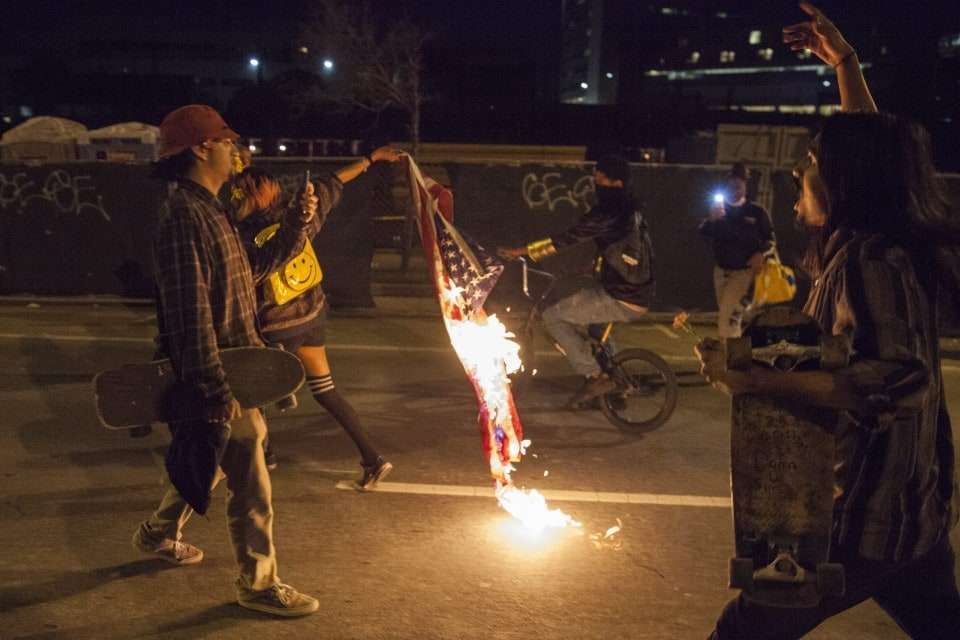The Volokh Conspiracy
Mostly law professors | Sometimes contrarian | Often libertarian | Always independent
White House Chief of Staff Reince Priebus speaks out in favor of banning flag-burning

From ABC News:
[GEORGE] KARL: And then just very quickly, the other thing he talked about is flag burners should either possibly go to jail or have their citizenship (INAUDIBLE)…
PRIEBUS: Our flag needs to - people need to stand up for our flag.
KARL: Is he going to pursue that?
PRIEBUS: You know, there's one thing that we have in common as Americans is our American flag. And I think it's something that, again, is probably going to get looked at.
But our flag should be protected and it's Donald Trump that talks about that issue.
And you know what?
It's a 70 percent issue in this country. He wins every day and twice on Sunday on our flag.
I doubt that any constitutional amendment to ban flag-burning is going anywhere; it went nowhere when it was proposed in the past two decades, and I suspect that it will go nowhere now. To be sure, my track record in predicting American politics over the past two years has not been great, so I might well be wrong; still, that's my sense of the matter. And I don't think the Supreme Court is on its own is likely to reverse its precedents striking down flag-burning bans. (Retired justice John Paul Stevens has continued to take the view that such laws are constitutional, but I doubt that many sitting justices would join him.)
Still, since Chief of Staff Reince Priebus and Candidate Donald Trump mentioned it, I thought I'd say it again: Banning flag-burning would be a very bad idea. Here is something I wrote about this back in 2009, when the issue had come up:
Here's a press release from Missouri Rep. Jo Ann Emerson …:
A resolution authored by U.S. Rep. Jo Ann Emerson (MO-08) is getting bipartisan support in the U.S. House of Representatives for a constitutional amendment to prevent desecration of the American flag.
"The American flag is more than a symbol, especially to the American men and women who have served in uniform, putting their lives at risk for our country with the flag stitched on their sleeves. People who desecrate our flag don't fully understand, and certainly do not respect, the service of these Americans in defense of our freedoms," Emerson said.
She also pointed out that, while the First Amendment protects free speech, it offers no protection for hate speech.
"When a flag is burned or desecrated, especially by another American citizen, a severe injury is inflicted on the patriots of this country who have served us and by those who have lost a loved one," Emerson added.
The proposed constitutional amendment is one sentence: "The Congress shall have power to prohibit the physical desecration of the flag of the United States."
Regarding the prospects for her measure's passage in the U.S. House of Representatives, Emerson said, "I think there is a lot of support for this idea in Congress, among veterans service organizations in our country, and by the American public. Before the Supreme Court invalidated flag protection laws in 1989, 48 U.S. states and the District of Columbia had measures on the books. I would very much like there to be an opportunity to restore that much-needed sanctity to our flag. It's a symbol of every American life spent or lost in the service of our country," Emerson said.
Since the 1989 Supreme Court ruling in the case of Texas v. Johnson, all 50 states have passed memorializing resolutions asking Congress to pass a constitutional amendment and to send it to the states for ratification.
Of course, neither the First Amendment nor the doctrine that the Court has developed under that amendment, has any exception for "hate speech." … But I think this also helps illustrate the dangers of "censorship envy," and of creating new constitutional exceptions, especially for ideas that some find repulsive.
Rep. Emerson seems to think the supposed constitutional exception for hate speech supports her proposed new exception. I take it that she also expects that some of the readers of the press release will take the same view. And why not? Once you conclude that hateful expression about this or that group is punishable, you might feel yourself like a dupe to tolerate expression that you see as hateful to the nation and the symbols you cherish. It's hard enough to tolerate offensive speech, harder still to tolerate offense when others aren't required to do the same.
Say, though, that a new First Amendment exception for flagburning is indeed recognized. Then the censorship envy I describe above will likely operate in reverse: There'll be still more pressure to recognize a "hate speech" exception in earnest. Once the law concludes that hateful expression towards America or the flag (even a narrowly defined sort of hateful expression) is punishable, others might feel themselves like dupes to tolerate expression that they see as hateful to their race or religion or ethnicity or sexual orientation or what have you.
And even if those people are defeated in their attempt to create a new "hate speech" exception - if an exception for anti-American symbols is recognized but by an exception for anti-Muslim or anti-black or anti-gay or what have you symbols is not - they will be understandably upset by what they'll see as unfair treatment. Instead of uniting us around a symbol, the amendment would divide us further.
See also this post on then-Sen. Jon Kyl's endorsement of a "freedom to offend"; Kyl was focused on the freedom to insult religions and religious symbols, but I think the logic likewise extends to the freedom to insult political symbols.


Show Comments (0)